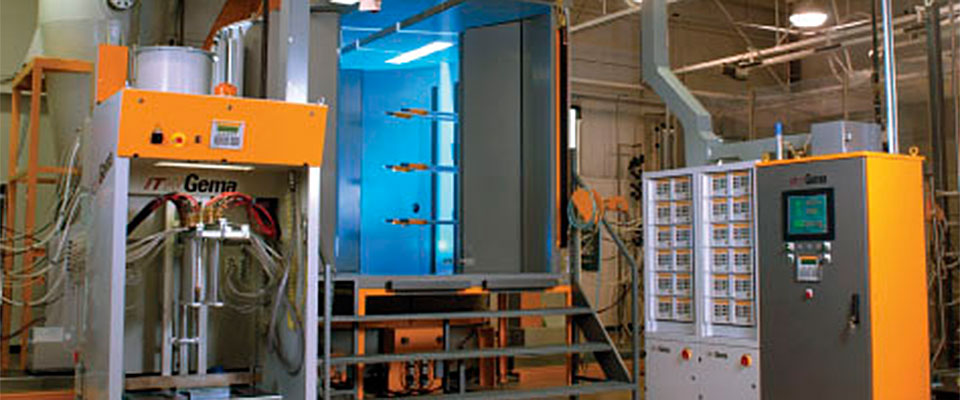
What is the best? To the average soul, the word “best” might be associated with the type of pizza he’d happily eat every day for a week, or a specific brand of jeans she insists on buying every time, no matter the cost.
We all have a different interpretation of what’s the “best,” and getting to that conclusion often takes significant thought, trial and error, and research. The same care should be taken when choosing the best finish for your light poles.
Aluminum can be anodized. Steel can be galvanized. But, it can all be powder coated.
In fact, the best coverage is one that offers both the aesthetic and durability for which the end-user is looking. And, a powder-coated finish can deliver. Below, we define what powder coating is, identify the different kinds, and list the major benefits.
So, What Is It?
Loose definition: it’s like the extra protective layer you never knew your light poles needed; the supreme wax you put on your car each month; the indestructible case you bought for your brand-new iPhone.
Technical definition: Powder coating is a protective and decorative finish that can be applied to virtually any type of metal. Polymer resin systems are combined with curatives, pigments, leveling agents, flow modifiers, and other additives. Those ingredients are melted, mixed, cooled and ground into a uniform powder similar in texture to baking flour.* Then, the powder is electrostatically sprayed onto the metal surface. The charged powder adheres to the electrically grounded surface (the light pole) until the powder is heated and fused into a smooth coating in the curing oven. The result: a uniform, durable, high-quality, and attractive finish.
Did you know? At United Lighting Standards, our light poles are most often finished with a state-of-the-art powder coating process, which leverages the latest technological advances in paint finishing. See more here.
*Sure, it looks delicious, but powder coating is not edible. Resist any urge to sprinkle it on cakes or puddings.
Types of Powder
There are four common types of powder coatings, each a chemical formulation of paint. They are:
1. Polyester – This powder coating provides industrial durability in outdoor settings. It’s tough, UV-resistant, and provides good corrosion resistance. Polyesters are also economical and come in a variety of colors.
Did you know? Polyester is the most widely used powder coating at United Lighting Standards.
2. Epoxy – It provides the ultimate corrosion resistance to chemicals. However, since epoxies are not UV-resistant, they’re not ideal for use on light poles. The best application for epoxies is oil and gas pipelines and “under the hood” auto parts, almost like a primer.
3. Polyurethane – Yes, it’s durable enough for the outdoors, but it tends to be pretty costly and can’t be applied as thick as other varieties.
4. Hybrid – It’s useful as indoor-grade powder coatings but should not be used in outdoor applications.
Main Benefits
Here are the advantages you can expect when you powder coat your metal structures:
• Cost-friendly: Compared to anodizing, galvanizing, or painting, powder coating is a lower-cost, high-quality finish. Which means you can spend more money on your company’s Christmas party or bring back Free Donut Friday.
• Durability: Powder coating is one of the strongest, long-lasting, and color-durable finishes available. It’s a tough, even, protective coating with no drips, sags, runs, or solvent popping. Plus, it’s more resistant to chipping, scratching, fading, rampaging birds – you get the gist.
• Go green: Compared to traditional liquid finishes containing chemical solvents that release volatile organic compounds (VOC) into the environment, powder coating emits nearly zero VOC and results in zero hazardous waste.
Did you know? Since the implementation of stringent air pollution control legislation, the powder coating industry has become one of the fastest-growing finishing technologies in North America.
• The safe option: As a material that’s less combustible than other finishes, powder coating allows production teams to work in a safe environment. It also has lower electrical requirements, nixes the danger of bringing hazardous materials on-site from inbound shipping, and results in lower insurance premiums.
• It’s pretty: Powder coatings come in virtually any color through the RAL system, the industry standard for paint and coatings (view RAL color options). Need we say more?
• Efficient as heck: Over time, the absence of VOCs and reduction of waste save you time and money. Powder coating also allows you more flexibility to tailor purchase quantities to fit your needs by buying only the necessary amount of powder coat, thus reducing wasted materials.
At the end of the day, the light poles you’ve chosen for your projects are an investment. So, protect that investment with the best finish available.
When you buy light poles from United Lighting Standards, you have the option of adding a state-of-the-art, multi-stage powder coating finish to your poles. The process varies depending on the material being coated and the warranty selected.
Curious to learn more? Ask Joe. For more details about how we use powder coating, check out our white paper, Powder Coating Finishes for Steel and Aluminum Light Poles.





